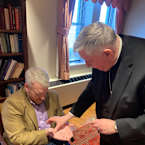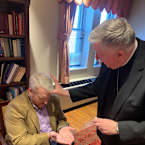
TL;DR Version: Yes, there is sadness in this life, but hope points to something bigger than melancholy. (Please see the end of the post for a prayer intention.)
Melancholy
Early on in this journey, there was a moment where I stopped in prayer and said, “I’m not ready, Lord, but let’s go.” This is a prayer that I have frequently recited throughout the past ten months. There are days I wish I could look back at everything I’ve been through and say, “now I’m ready,” but that is not the reality. Don’t get me wrong, I’m better prepared for what is happening and for what might be next, but I’m still not “ready.”
I’ve been feeling a certain melancholy lately. Beth and others have asked if there is something in particular such as a doctor’s appointment, lab results, ED visits, etc. that is at the root of the melancholy. I do not think anyone would fault me, or anyone going through a similar trial, for feeling a pensive sadness during periods suffering.
St. John Paul II taught that “Christianity proclaims the essential good of existence and the good of that which exists… Man suffers on account of evil, which is a certain lack, limitation or distortion of good. We could say that many suffers because of a good in which he does not share, from which in a certain sense he is cut off… He particularly suffers when he ought – in the normal order of things – to have a share in this good and does not have it.” (Salvifici Doloris p. 7 [bold emphasis added])
In my particular case, the good in which I do not share is good health. This is not unique to me and it is not unique to physical health. It is entirely reasonable to say that each of us can look at our lives and identify a period of suffering due to “a good in which [we did] not share.” Melancholy is a perfectly normal emotional response to this deprivation of a fundamental good.
Hope
Many Catholics are devoting particular attention to the word “hope” this year. Pope Francis declared this year to be a Jubilee Year of Hope. We can have a discussion on jubilee years at another point in time, but let’s take a moment to focus on hope.
“Hope is the theological virtue by which we desire the kingdom of heaven and eternal life as our happiness, placing our trust in Christ’s promises and relying not on our own strength, but on the help of the grace of the Holy Spirit…
The virtue of hope responds to the aspiration to happiness which God has placed in the heart of every man; it takes up the hopes that inspire men’s activities and purifies them so as to order them to the Kingdom of heaven; it keeps man from discouragement; it sustains him during times of abandonment; it opens up his heart in expectation of eternal beatitude. Buoyed up by hope, he is preserved from selfishness and led to the happiness that flows from charity.”
(Catechism of the Catholic Church 1817-1818)
If faith expresses our belief that God is who He says He is and that heaven is real, then hope is the trust that God wants us to be there when this earthly pilgrimage has ended and is working to bring us to Heaven!
Suffering reminds us that we are not currently in heaven. Hope reminds us that suffering does not have to be the final destination. This is why prayer and the sacraments have been so important to me throughout my particular “Way of the Cross.” They don’t necessarily stop the suffering, but they do point towards the hope of heaven.
Anointing of the Sick
I was privileged to receive Sacramental Anointing of the Sick yesterday from Archbishop Mitchell Rozanski. It is important to remember that the Sacrament is a source of grace each time it is received, whether it is from a priest or bishop. The ritual includes asking for God’s mercy, asking for healing, and asking for assistance to bear the burden of suffering. We ask God to heal us of our ailments, if it be His will, and to prepare us to be with Him in heaven when this earthly life has ended.
I am always struck by the beauty of the prayers of anointing:
“Through this holy anointing may the Lord in his love and mercy help you with the grace of the Holy Spirit. Amen. May the Lord who frees you from sin save you and raise you up. Amen.”
Notice how the prayer does not ask God to remove the cancer from my life. Rather, the prayers ask God to bestow the grace needed to bear this cross and prepare me for heaven. It doesn’t close the door on physical healing, but it orients us on a goal bigger than physical healing. I would happily accept physical healing, but I pray daily that I would always desire heaven more than healing from cancer.
Conclusion
It has been a long post. I will conclude with this thought. At the beginning of the prayers yesterday, the Archbishop said a familiar phrase: “Peace be with you.” These are not just “nice” words or “beautiful symbolism.” I firmly believe that Archbishop Rozanski, through the Sacrament of Holy Orders, is a direct successor to the Apostles appointed by our Lord Jesus Christ during His earthly ministry. His words “peace be with you” are efficacious. He has the authority to bestow the peace of Christ. You and I might wish each other peace (I hope you find peace in this situation). The Archbishop literally granted the peace of Christ as one literally gives a gift on a Christmas or a birthday.
I later received a text message from my friend who had arranged for yesterday’s anointing. I shared with him that I was tired, but very much at peace following the anointing. This was not coincidental. It was the efficacy of the Sacrament. It was the power of prayer. It was the trust that hope gives, reminding us that Heaven is greater than any melancholy or suffering we might be enduring at the present time.
Prayer Intention
Many times we think of our (arch)bishops as administrators. While governance is a principal component of their office, it is rooted in their priesthood. It’s easy to armchair quarterback the work of our Church leaders, but in doing so, we often risk separating their governance from their priestly ministry. Please pray for the priestly vocation of your (arch)bishop. Pray that it permeates the whole of their ministry. Their priestly vocation is not just an honorary title or office, it’s an indelible mark on their souls that grants graces through their ministry. Our Lord says “my yoke is easy and my burden light,” but it is safe to say that our priests and bishops carry a significant portion of that burden. They need our prayers too.

